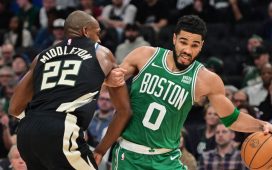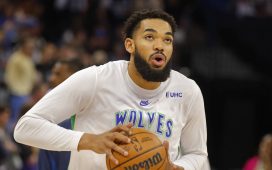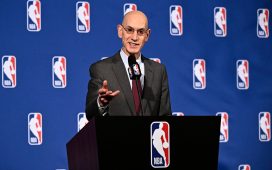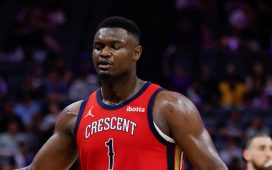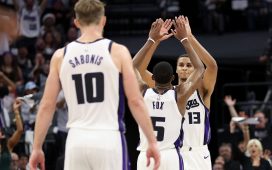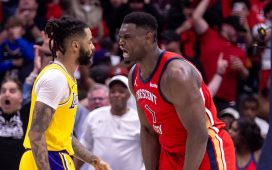Across four franchises and 16 seasons, Chris Paul has been the picture of sameness. Even as a litany of leg injuries sapped him of his speed and the ongoing dorkball revolution rewired the sport, Paul has always drawn from a familiar, drab palette. Apologies to Heraclitus (R.I.P. bozo), but the only constant in life is Chris Paul refusing to change, playing slowly, making about half of his mid-range jumpers and being a jerk while doing so. Behold basketball as a bullfight — Paul alone straining against a massive chaotic force until he has bent it to his will. In Paul’s hands, the game’s fundamental disorder becomes downright orderly. On offense, he quickly scans and solves defensive schemes as if he’s filling out a census form. Defensively, he casually rotates to the exact spot where he can preemptively dam holes in the perimeter shell before they can open. There are no operatic flourishes in his game; he doesn’t peel off jagged, expressive riffs with the ball; the only beauty is the lack thereof.
Yet, after years of warring against basketball’s moments of spontaneous joy, Paul now finds himself at the helm of the NBA’s most joyous team. Amidst a soggily reheated bummer of an NBA season, the Phoenix Suns have been a much needed injection of mirth. Their arena pulses with the same insanity that would compel somebody to live where the temperature is 115 degrees. Their fans throw impromptu welcome parties at the airport in their honor; when Torrey Craig catches an alley-oop, the crowd turns glossolalic; on the court, the Suns brim with the synchronicity and enthusiasm of guys who love to play basketball with each other. The Valley Boyz are thinking Hooters tonight with the fellas. Suns in four, the heavens echo.
As such, the Suns have adopted Paul’s style, not his sensibility. Like nearly every Chris Paul team, the Suns play at a slow tempo, make their bones in the pick-and-roll, and possess a microscopic turnover rate. Unlike nearly every other Chris Paul team, the Suns don’t appear universally terrified of and reliant upon Paul. Notably, Paul is neither the Suns’ most prolific offensive player nor their defensive anchor; in the playoffs thus far, Paul’s usage rate lags dramatically behind that of Devin Booker and Cameron Payne.
Paul’s teammates are faithful disciples of the Point God, built in his image and forgiving of his sins. Crucially, Devin Booker has made the leap from a Really Cool Guy (Who’s Also a Good Player) to a Really Good Player (Who’s Also a Cool Guy). For the first five years of his career, Booker toiled on bad teams as an avatar of Mamba Mentality Originalism — never mind that his teams stunk, he was a star because he scored with a studied grace. Now, he’s the pace-setter for one of the league’s elite attacks, marrying his previous ball-dominance with smart off-ball movement around Paul. On the occasions when Paul’s steadiness safety-locks the offense in place, Booker’s shot-making provides a reinvigorating jolt. More, Booker allows the Suns to thrive beyond the framework that Paul imposes. Over the course of his career, Paul has been such a commanding presence that his teammates were often unable to function without him — on just about every team he’s played on since 2007, Paul-less lineups have collapsed without their load-bearing star, according to Cleaning the Glass. Booker offers a necessary counterbalance, relieving the burden on Paul and ensuring that the Suns’ offense can keep humming
Similarly, Paul’s arrival has helped Ayton discover that complex problems can be addressed with simple solutions. Through the first two rounds, Ayton (relatively) stymied Lebron James and then Nikola Jokic by being huge and fast and holding his hands perfectly straight above his head; he’s become a key cog in the Suns’ offense because he no longer misses shots. Ayton’s relationship with Paul is a symbiotic one: Paul’s pick-and-roll omniscience creates spoon-fed buckets for Ayton; Ayton’s gravity as a roller and offensive rebounder puts pressure on the rim that the 36-year-old Paul can’t generate on his own. On the other end, Paul’s communication aligns the defense and, in turn, Ayton tidies up Paul’s mistakes. Ayton is the brawn to Paul’s brain–the Macbeth to his Lady Macbeth, the Groot to his Rocket.
In this sense, Paul’s greatest impact is his inherent organizing influence. He’s broken the Suns’ decade-long playoff drought because he makes things make sense. With him on the roster, the rest of the players snap into their most natural roles. Coming into the season, the Suns were a promising, inchoate gumbo of mish-mashed parts. There’s limited utility in having a secondary playmaker without an accompanying primary, a roller with nobody to set picks for, or three-and-D wings who don’t get good opportunities to shoot threes. But add Chris Paul to the pot and, baby, you got a stew going.
Most important, this stew keeps simmering even when Paul isn’t actively part of it himself; Phoenix maintains the efficiency margin of a 54-win team when Paul rests, per Cleaning the Glass. If that’s too jargony, here’s a clearer example: facing a 2-1 deficit in the first round, the Suns boat-raced the Lakers for three straight games to close out the series, despite a pinched nerve in Paul’s shoulder that largely rendered him unable to shoot from farther than 12 feet or dribble without grimacing. And he made peace with it. For the series, Paul averaged less than 10 points and 30 minutes per game (both personal playoff lows) and amicably split a timeshare at point guard with Cam Payne. Ultimately, Paul’s impact in absentia (and the length of that absence) could determine Paul’s place in the point guard pantheon.
In the rush to appreciate Paul while he’s still active, a predictable, facile narrative has formed around the Suns. Somehow, the story of Paul teaming up with an immensely talented core of young players and a smart coach has been retrofitted to match the specifications of every cliched sports movie ever made — Chris Paul is the no-nonsense veteran with the heart of gold who’s taught this ragamuffin group of rugrats what it takes to be a Winner. Paul was given courtesy votes on the backend of MVP ballots because of his intangibles and his ability to do things that can’t be measured by a boxscore.
Fittingly, Paul has done less than he has at pretty much any other point in his career. That’s not an indictment or a criticism; it’s a fact — maybe even a compliment. In Phoenix, Paul averaged the fewest minutes of his career and racked up both steals and free throws less frequently than ever before. His usage rate was the second lowest it’s been since he left New Orleans in 2011 and his assist rate is the third lowest over that same span. To be fair, Paul did improve the Suns through maniac micro-managing because he’s Chris Paul and that’s what Chris Paul does. But, really, this year has been the story of Paul masterfully mellowing with age. As stunningly effective as he still is, he’s no longer the world-conqueror that he was in the late 2000s. His game has very real limitations, but he thrives within them. Too slow and ground-bound to meet centers at the rim, he simply lofts mid-range shots over them. He hits passing windows as soon as they open because he no longer has the luxury of being able to zoom through defenses and exploit their continuous, panicked rotations. Whereas Paul’s history is full of tragically doomed heroism and ambition, he’s seemingly found comfort within his contracted realm of the possible. Only four wins away from his first Finals appearance, he can finally seize the success that’s eluded him by learning to let go.

